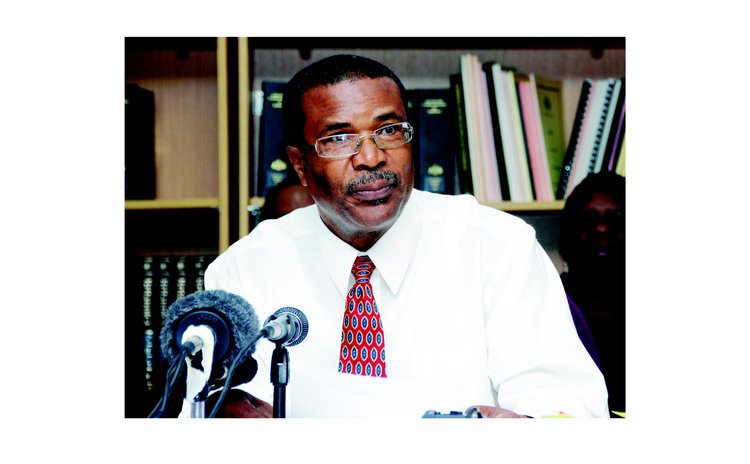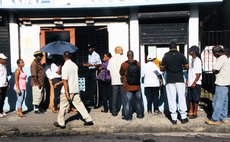How healthy is health?
Election Issue: What is the state of the health care sector

The doctor's prognosis isn't encouraging. It's not that the health care system here is on life support, Dr. Irving Pascal was at pains to explain to The Sun.
"I don't want to cause panic," he said repeatedly.
It's that the leadership of health care is in a critical condition, he suggested.
"I think there's a crisis in the leadership in Dominica or there are serious deficiencies of those charged with the leadership of health in the country," said the doctor, who recently wrote a scathing commentary on the delivery of quality health services here, describing it as being "on a slippery slope".
Dr. Pascal bases his conclusion on two issues: how the ministry of health "went about trying to limit the mobility and mortality" of the chikungunya virus outbreak and the decisions that went into the construction of the new multi-million dollar hospital.
"If those are examples of what we have to look forward to, if the representation of those major issues reflects the provision of health care in Dominica, we are headed for a slippery slope," he told The Sun in a telephone interview.
The health minister, Julius Timothy, in his contribution to the 2014/15 budget debate, made reference to plans to construct the new hospital.
"New Hospital Construction was also a major area of focus for the Ministry of Health during this financial year. A team of Chinese technicians visited the island to present a concept design for the New Hospital Project," the minister said in his presentation, a copy of which was obtained by The Sun ahead of its delivery.
"A request for technical assistance was subsequently submitted to PAHO (the Pan American Health Organization) for a review of the design proposal and for the preparation of a design counterproposal," he added.
The hospital remains a sore point for Dr. Pascal, who contends that it's being built with no clear purpose, no clear idea how it is supposed to make a difference to the lives of Dominicans, and no input from people who know better. "You're going to spend (millions of dollars) to build a new hospital and you cannot say which of your challenges to health care that this new hospital is going to address…it's not based on the health care research and stakeholders input into it as to how to go about it," he complained.
A report entitled, Dominica Health Systems and Private Sector Assessment, prepared by USAID as part of its Health Systems 20/20 programme, found that there was indeed a lack of public involvement in the decision-making process.
"While a hospital building committee has begun planning for the new hospital, this committee is currently comprised of government officials. Expanding the level of stakeholder involvement, through town halls and community forums, and through private sector engagement, would give citizens more of an opportunity to express their views on the new hospital while soliciting ideas for optimal design and management from private health provider and business leaders," states the report, which was completed in March 2012 following an assessment aimed at improving the country's capacity "to effectively lead, finance, manage, and sustain the delivery of quality health services".
The health sector is guided mainly by the National Strategic Plan for Health 2010-2019, which was launched in November 2010. It lists population health, health determinants, systems, services and resources for health as the key to the framework for action.
"I welcome the launch of this new strategic plan for health which offers a practical approach to strengthening the health system and will ensure greater mechanism for improved user satisfaction of the services provided," the prime minister, Roosevelt Skerrit, said at the launch.
The USAID assessment revealed that service delivery at the Princess Margaret Hospiral faced several challenges that eroded public trust in the institution.
"The management of PMH, the pinnacle of the Dominican health system, possesses little authority in the day-to-day operations of the hospital, with decisions often deferred to the cabinet. This emphasizes the main drawback of health sector governance in Dominica – that policy decision-making is centralized within the MOH, with relevant civil society actors, private sector stakeholders and other ministries not fully involved," the report says.
It recommends that in the short term the authorities should use the building of the new hospital "to rationalize management and quality assurance structures" and to reform the management of the PMH.
"This report agrees with two earlier recommendations from KPMG and the CDB to overhaul the management structure of the hospital. Instituting a board that would be responsible for the strategic direction of the hospital and a chief executive officer (CEO) who would be responsible for the day-to-day management of the hospital are the two cornerstones of this reform. This structure would promote management accountability through the CEO, with MOH leaders, technical experts and community leaders comprising the management board. This would also remove the hospital from political influence."
Longer term recommendations include soliciting broad stakeholder input to ensure that the proposed new hospital functions optimally and is responsive to the needs of the population.



